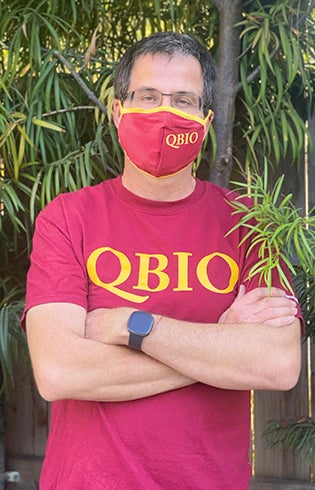
Quantitative biology opens doors to a range of careers
Biology has come a long way since Aristotle first began observing living organisms to understand what separates them from inanimate objects. From microscopes that allow scientists to peer at the molecules within cells to satellites that track the movement of living organisms around the globe, the tools of the trade have evolved over the centuries, and in the process produce unprecedented amounts of data.
A new branch of science has emerged to help make sense of the growing, increasingly complex trove of information. Dubbed quantitative biology — or “QBIO,” as the students at the USC Dornsife Letters, Arts and Sciences call it — the discipline combines mathematics and the latest computational technology with experimental biology to better understand how living systems work.
In 2017, USC Dornsife launched one of the first QBIO majors in the United States, aiming to produce top-notch biologists who also know how to rigorously analyze data. Courses in the biological sciences feature prominently in the course curriculum, but the major also includes a notably healthy dose of mathematics and computer sciences courses. These subjects are critical for efficiently analyzing the vast amounts of data — known as “big data” — generated by today’s advanced research technology.
“The biological sciences — across the board from human health to neuroscience and from ecology and evolution to environmental microbiology — are becoming ever more big-data driven,” said Jan Amend, divisional dean for the life sciences and professor of Earth sciences and biological sciences at USC Dornsife. “The QBIO major at USC Dornsife provides the ideal education and training for students with interests and aptitude in computational and mathematical approaches to solving problems in biology.”
Not just analyzing data
Remo Rohs led the charge for establishing the major at USC Dornsife. As a professor of biological sciences, chemistry, physics and astronomy, and computer science, he has clear insight into the value of researchers gaining strong computational skills. But he and his colleagues didn’t want to focus only on the analysis — they also wanted to train students to conduct the biology experiments that produce the data.

“Quantitative biology has a little broader definition. It includes experimental research, where you generate lots of data, and then you analyze the data with computational methods,” he said. “We didn’t want students to think it’s just the second part, the analysis.”
With this in mind, the program was designed with undergraduate research integrated into the curriculum. Students spend time learning the basics of experimental biology in diverse labs throughout the university.
This approach paid off for the first group of QBIO graduates, including Nicholas Markarian ’20, who was sought after by several top graduate programs in the United States.
“Nicholas was taking my class last fall, but he spent most of his time on airplanes because he was interviewed by all the top universities,” Rohs said, adding that he wants that kind of success for all of his students.
Markarian is now working toward his M.D./Ph.D. through a joint program offered by Caltech and Keck School of Medicine of USC. He says QBIO gave him an edge while applying to graduate programs.
“It’s crazy how many subfields are actually available to go into after having this foundation through QBIO,” he said.
QBIO graduates have options
A QBIO degree can also open career paths outside of medicine or academia, says Keith Camoosa, former senior vice president of data intelligence for Warner Brothers entertainment company. He says graduates of the program are well-suited to address important challenges in business, for instance.
“Driven by … the enormous volume of data being generated from digital businesses,” he said, “data science has established itself as an important business function, like finance, within most industries.”
Camoosa has used these skills himself at Warner Brothers. “Data scientists help the studio make data-informed decisions across all of its lines of business including movies, TV shows and video games. In practical terms, this might include tuning an algorithm for a recommendation system embedded in a streaming video application, estimating the propensity of an individual customer to renew or cancel a subscription or predicting the box office.”
Camoosa said that attributes common to successful QBIO graduates translate to the business world.
“Successful data scientists tend to share certain characteristics such as being innately curious … and being able to learn and adapt to new technologies, tools, methods and business models.”
Andrew McConnell Stott is vice provost for academic programs and dean of the graduate school at USC, and former college dean of undergraduate education and academic affairs at USC Dornsife. He agrees with Camoosa’s observation.
“QBIO is an excellent example of USC Dornsife’s approach to developing students whose educational experiences cover a breadth of disciplines,” he said. “We find this approach better prepares them for a broad array of careers.”
It’s not what you know or who you know — it’s both
As is true with many pursuits, having a strong network of support can be an important factor in success. Rohs says the sense of community among those in the QBIO program marks a critical component.
“We care a lot about community. We have events, even now virtually; we meet every month with all students in the major. We have a peer mentoring program where the more senior students mentor the more junior students.
“Part of making students successful in a more challenging major like QBIO is community because if they are not alone, if they are doing this together, then they go higher in their academic work.”